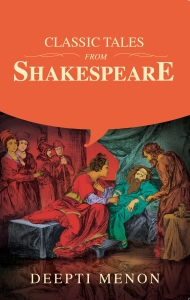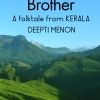
A Note on William Shakespeare
(23rd April, 1564–23rd April, 1616)
‘All the world’s a stage,
And all the men and women merely players;
They have their exits and their entrances;
And one man in his time plays many parts,
His acts being seven ages.’
- Jacques—As You Like It
In the vast canvas of English literature, the one name that stands out like a beacon, throwing light over his contemporaries, is that of William Shakespeare. Not for nothing is he referred to as England’s national poet and the Bard of Avon.
Stratford-upon-Avon basks in reflected glory. William was born there in 1564 to John Shakespeare and Mary Arden, the third of their eight children. He attended the King’s New School and was imparted intensive education of the grammar based on Latin classical authors, a fact that certainly influenced his writings later in life. At the age of 18, William met Anne Hathaway, eight years older than he was, and his life changed. As someone said jokingly, ‘Anne “hath her way” and she married William.’ They had three children—Susanna, and the twins Hamnet and Judith.
The Elizabethan era saw the Renaissance of art and literature. Shakespeare burst onto the scene with two long poems. He was one of the founding members of a theatre troupe called The Chamberlain’s Men, which went on to stage many of his plays. What a glorious career it was, as he did ‘strut his way across the stage’ creating magic all the way! Shakespeare wrote 38 plays, 2 narrative poems, 154 sonnets (14-line poems) and numerous other poems. None of the original manuscripts are available today. Luckily, a group of players who performed the plays compiled around 36 of his plays and published them in the First Folio. The world owes them a debt of gratitude for this. Shakespeare also created a historical space which was aptly named The Globe Theatre, and even today, thousands of tourists flock to it to experience how it felt to view drama during his time.
Why is Shakespeare still being read, his plays enacted? How many adaptations of his works have found niches for themselves, be it in movies, books or theatre? Hundreds of titles of books, plays, musicals and films have been adapted from Shakespearean quotes: The Sound and The Fury by William Faulkner, Under the Greenwood Tree by Thomas Hardy, Brave New World by Aldous Huxley, North by Northwest by Alfred Hitchcock, The Moon is Down by John Steinbeck, Something Wicked This Way Comes by Ray Bradbury and even the popular The Fault in Our Stars by John Green.
There are so many phrases and adages that are in common parlance, thrown around so carelessly, but few know that they originated from Shakespeare’s prolific pen. For example, ‘all that glitters is not gold’, ‘the be-all and end-all’, ‘the world’s my oyster’, ‘as luck would have it’, ‘neither a borrower nor a lender be’, ‘wild goose chase’ and many more.
Shakespeare’s plays were grand spectacles, but there were concepts that appealed both to the rich and the poor. They held a mirror up to life, often incorporating elements of magic, romance, passion and philanthropy, on one hand, and the baser emotions like envy, greed, ambition, and hatred on the other. His was a vast canvas populated by kings and queens, princes and princesses, merchants and money lenders, spirits and fairies, lovers and enemies. His tragedies had heroes with fatal flaws, his comedies encapsulated the philosophy of life often pronounced by fools and jesters who were wiser than the wisest.
As Shakespeare grew older, his plays also followed a natural progression from historical themes, like Richard III and Henry IV, V and VI, to more playful ones, like A Midsummer Night’s Dream, Much Ado About Nothing, The Merchant of Venice and Twelfth Night.
It was closer to the autumn of his life that his tragic plays like Macbeth, Hamlet, Othello, Coriolanus and King Lear were written. These were considered his triumphs and have been staged more often than any of his earlier works. His sonnets were intensely personal, often revealing Shakespeare’s views on topics like life, love, religion and marriage.
If there is one towering figure that has influenced many personages like Charles Dickens, Herman Melville, Agatha Christie and Anthony Burgess, it is the Bard. His influence has also been felt in the realms of music and art, opera and psychology.
As Cassius remarked to Brutus in Julius Caesar:
‘Why, man, he doth bestride the narrow world
Like a Colossus, and we petty men
Walk under his huge legs and peep about
To find ourselves dishonourable graves.’
He could as well have been lauding Shakespeare for having been the most spectacular playwright and man of letters of the time, and beyond, even till the present day. This book contains ten stories adapted from the original plays of William Shakespeare, in chronological order.
As the author and adaptor, I have ‘attempted’ to narrate these classic stories in a way that may be intelligible and interesting to the younger generation, children between the ages of ten and seventeen. Of course, this is merely a surmise. The stories are out there for all those who love Shakespeare and his storytelling, and that is the reason why I have retained a few lines from the original texts so that the reader may savour a tentative taste of the language, and hopefully, go on to make a full meal of it.
The stories have been chosen with care because, to carry on the above metaphor, reading Shakespeare is like sampling a buffet, where there are so many dishes that unless chosen judiciously, might lead the taster on to indigestion. For that very reason, I have combined tragedy and comedy with history so that there is a hint of every flavour and a surfeit of none. I do hope, from the bottom of my heart, that I have succeeded in my task. If not, let me apologize and end with the words of Robin Goodfellow (the lovable Puck) from A Midsummer Night’s Dream:
‘If we shadows have offended,
Think but this, and all is mended,
That you have but slumbered here
While these visions did appear.
And this weak and idle theme,
No more yielding but a dream,
Gentles, do not reprehend:
If you pardon, we will mend:
And, as I am an honest Puck,
If we have unearned luck
Now to ‘scape the serpent’s tongue,
We will make amends ere long;
Else the Puck a liar call;
So, good night unto you all.
Give me your hands, if we be friends,
And Robin shall restore amends.’
Deepti Menon, Thrissur, 2023
About the Author







Comments